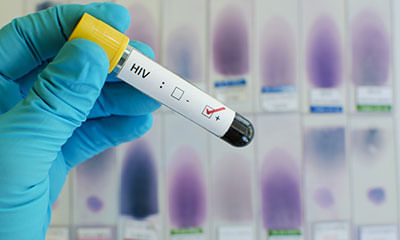Medicine For HIV AIDS
I was exposed on 1st july and then I took pep tablets within 70 hours. I started taking this medicine on july 4th. Its c ...
Ask Free Question
I am sorry to hear about your concern but will be happy to assist you. Antibody tests can usually detect hiv 23 to 90 days after exposure. Most rapid tests and self-tests are antibody tests. A rapid antigen/antibody test done with blood from a finger stick can usually detect hiv 18 to 90 days after exposure. Let's connect over a call so that we can discuss your concern in details and make a treatment plan for you.
I have test multiple times for hiv in 72 days of exposure. All came back negative there were naat, rna pcr, 4gen test, v ...
Ask Free Question
Hi ,see testing is routine procedure which has to be done take homoeopathic medicines side by side to cure symptoms which causing your day today life disturbed.
Does taking antidepressants ssris during the whole hiv window period (90 days) daily affect the third generation hiv ant ...
Ask Free Question
The hiv 3rd generation test is a sensitive and accurate test that detects the presence of hiv antibodies in the blood. It can be used to detect hiv infection in individuals who have been exposed to the virus at least three weeks prior to the test. The presence of ssris in the body is unlikely to interfere with the test's ability to detect hiv antibodies. Actually most drugs do not affect test efficiency. Only some immunosuppression drugs, chemo, steroids may affect test accuracy. Though many drugs affect treatment efficiency by increasing or decreasing metabolism of drugs.
Sir, meri wife just 10 din pehle hiv positive aayi he abhi jab usne dawai chalu kari to uske sarir par red red dane type ...
Ask Free Question
It could be a sign of allergic reaction to medicine or paradoxical worsening due to immune reactivation. Contact a doctor physically, best would be one from whom you are taking medicines for hiv.
My sister is 10 years old and she is a tb infection patient since february her medication had started and before that sh ...
Ask Free Question
Her period might have started early due to medicines of typhoid. Donot worry the mc will start slowly.
Is viraday good pep medicine? If someone is using it for 2 days but it's side effects are strong .can it be changed by a ...
Ask Free Question
It's not a good medicine for pep. It can be changed. But first we need to establish if you really need pep. Please take private consultation with audio video chat and then I can guide you properly and tell you what is the best way forward. Don't play with life like this. One can also get suicidal ideations on viraday.
Taking of trioday tablet of cipla for hiv pts is same treatment like art treatment. ...
Ask Free Question
No. That is one of the treatment. Combination of three drugs. But that is old one and number if new and better drugs are now available. Please take private consultation with audio video chat and then I can guide you properly and tell you what is the best way forward. Ideally personal consultation is better and you are not far from mumbai.
I am recently feeling pricking in my fingers of both legs, pain in my calf muscle of left leg and sometimes a burning se ...
Ask Free Question
A burning sensation in your feet may be caused by nerve damage in the legs, also called neuropathy. Although many medical conditions can cause burning feet, diabetesis the most common. Most burning feet treatments focus on preventing further nerve damage and reducing pain. Causes of burning feet most often, neuropathy is the cause of burning feet. Damaged nerve fibers are more likely to become overactive and misfire. The damaged nerves send pain signals to the brain even though there is no wound. In most people with neuropathy, the leg nerves become damaged first. These people often have tingling and numbness in the feet as well. Many people complain that their feet are overly sensitive to touch (hyperesthesia) and can have varying degrees of burning pain. It can range from mild to disabling. Diabetes and alcohol abuse are by far the most common causes of neuropathy in the legs. Many other conditions can cause neuropathy or a burning sensation in the feet: besides neuropathy, infections and inflammation of the feet can also cause a burning sensation. The most common of these is athlete's foot, an infection of the skin caused by fungus. Peripheral artery disease (pad) also commonly causes burning feet. The poor circulation of blood to the feet may frequently cause pain, tingling, and burning feet, especially while walking. •chronic kidney disease (uremia) •small fiber neuropathy •vitamin deficiency (vitamin b12, folate, and occasionally vitamin b6) •alcohol abuse •low thyroid hormone levels (hypothyroidism) •lyme disease •hiv/aids •amyloid polyneuropathy •drug side effects, including chemotherapy drugs, vitamin b6 overdose, hiv medicines, amiodarone, isoniazid, metformin, and others •erythromelalgia •heavy metal poisoning (lead, mercury, arsenic) •vasculitis (inflammation of bloodvessels) •sarcoidosis •guillain-barre syndrome (gbs) •chronic inflammatory demyelinating polyneuropathy (cidp) •always use the footwear of proper fitting and which is comfortable. •always use socks. Never use shoes without socks. •after a long day work, it is advisable to stretch and also to ice your feet. •provide rest to your feet as much as you can. •avoid the use of alcohol or any narcotic items. •acupuncture or magnetic therapy shall be done whenever possible to keep the nerves active. •follow all the instructions as given by the doctor. Burning foot painburning foot pain is a common complaint, usually as a result of damage to the nerves of the foot or leg. It may develop due to an injury or medical condition either of which can cause compression of the nerves. Our nerves are the structures that carry messages to and from the brain. They tell our muscles when and how to work and are responsible for sensation including pressure and temperature. Damage to the nerves affects how these signals are transmitted. Burning type symptoms may be constant or come and go, vary in intensity and be accompanied by other sensations such as pins and needles or numbness. It all depends on what is causing the problem. Causes of burning foot painaccurate diagnosis of burning foot pain is vital to ensure appropriate treatment is started as soon as possible to prevent further damage. Here we will look at the most common causes of burning pain in feet, how they present, what causes them and how they are treated. Treatmentcold water foot baths, vitamin b supplements, comfortable footwear (mcr chapelles)
Hi doctor! my mother is 48 years old and she has diabetes. We take good care of her diet but still, her cholesterol leve ...
Ask Free Question
Hi, in her case uncontrolled diabetes, liver issues, metabolic syndrome, thyroid, diet & weight might be responsible factors. Blood tests might help to find out the main culprit. Diet control, wt reduction, regular medicines will help to control high cholesterol levels. Can consult online via private consult for detalied & personalized treatment plan.
What is anemia? What tests are the required for anemia? What is iron deficiency? What is b12 deficiency? How iron and b1 ...
Ask Free Question
Hi Anemia is a condition in which you lack enough healthy red blood cells to carry adequate oxygen to your body's tissues. Having anemia, also referred to as low hemoglobin, can make you feel tired and weak. There are many forms of anemia, each with its own cause. Anemia can be temporary or long term and can range from mild to severe. In most cases, anemia has more than one cause. See your doctor if you suspect that you have anemia. It can be a warning sign of serious illness. Symptoms Anemia signs and symptoms vary depending on the cause and severity of anemia. Depending on the causes of your anemia, you might have no symptoms. Signs and symptoms, if they do occur, might include: Fatigue Weakness Pale or yellowish skin Irregular heartbeats Shortness of breath Dizziness or lightheadedness Chest pain Cold hands and feet Headaches Iron deficiency anemia. This most common type of anemia is caused by a shortage of iron in your body. Your bone marrow needs iron to make hemoglobin. Without adequate iron, your body can't produce enough hemoglobin for red blood cells. Without iron supplementation, this type of anemia occurs in many pregnant women. It's also caused by blood loss, such as from heavy menstrual bleeding; an ulcer in the stomach or small bowel; cancer of the large bowel; and regular use of some pain relievers that are available without a prescription, especially aspirin, which can cause inflammation of the stomach lining resulting in blood loss. It's important to determine the source of iron deficiency to prevent recurrence of the anemia. Vitamin deficiency anemia. Besides iron, your body needs folate and vitamin B-12 to produce enough healthy red blood cells. A diet lacking in these and other key nutrients can cause decreased red blood cell production. Some people who consume enough B-12 aren't able to absorb the vitamin. This can lead to vitamin deficiency anemia, also known as pernicious anemia. Anemia of inflammation. Certain diseases — such as cancer, HIV/AIDS, rheumatoid arthritis, kidney disease, Crohn's disease and other acute or chronic inflammatory diseases — can interfere with the production of red blood cells. Aplastic anemia. This rare, life-threatening anemia occurs when your body doesn't produce enough red blood cells. Causes of aplastic anemia include infections, certain medicines, autoimmune diseases and exposure to toxic chemicals. Anemias associated with bone marrow disease. A variety of diseases, such as leukemia and myelofibrosis, can cause anemia by affecting blood production in your bone marrow. The effects of these types of cancer and cancer-like disorders vary from mild to life-threatening. Hemolytic anemias. This group of anemias develops when red blood cells are destroyed faster than bone marrow can replace them. Certain blood diseases increase red blood cell destruction. You can inherit a hemolytic anemia, or you can develop it later in life. Sickle cell anemia. This inherited and sometimes serious condition is a hemolytic anemia. It's caused by a defective form of hemoglobin that forces red blood cells to assume an abnormal crescent (sickle) shape. These irregular blood cells die prematurely, resulting in a chronic shortage of red blood cells. you can consult for more information








